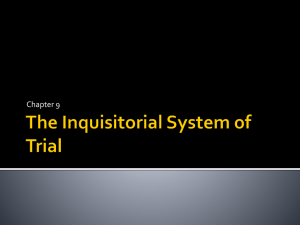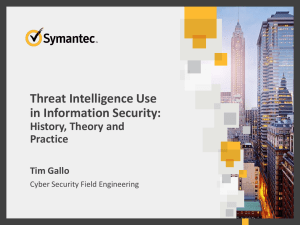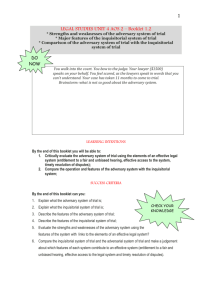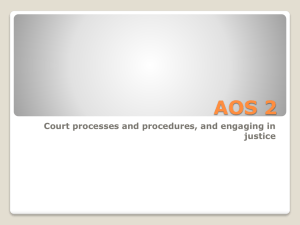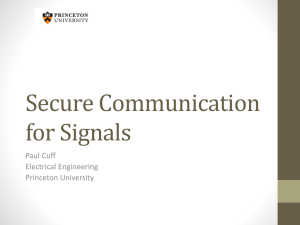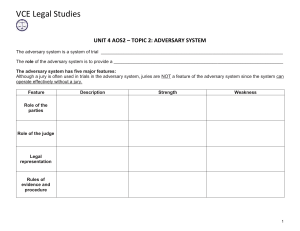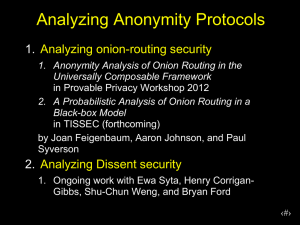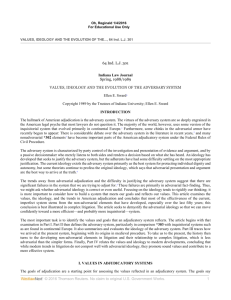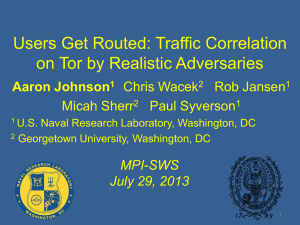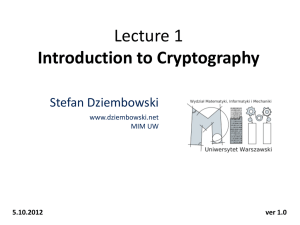the adversary system
advertisement
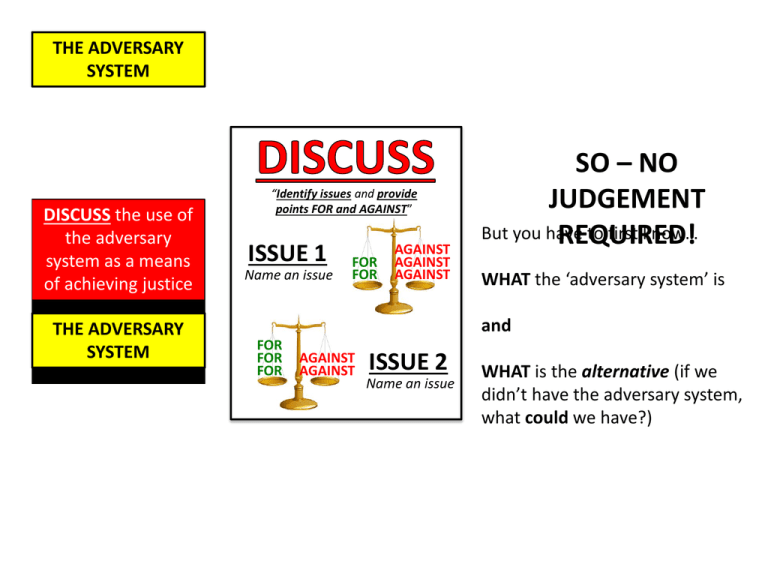
THE ADVERSARY SYSTEM DISCUSS the use of the adversary system as a means of achieving justice THE ADVERSARY SYSTEM “Identify issues and provide points FOR and AGAINST” ISSUE 1 Name an issue FOR FOR AGAINST AGAINST AGAINST SO – NO JUDGEMENT But you have to first know… REQUIRED! WHAT the ‘adversary system’ is and FOR FOR FOR AGAINST AGAINST ISSUE 2 Name an issue WHAT is the alternative (if we didn’t have the adversary system, what could we have?) THE ADVERSARY SYSTEM “ADVERSARY” = OPPONENT JUDGE Decides on Questions of Law THE ADVERSARY SYSTEM Doesn’t do any investigating. Doesn’t cross examine the witnesses. Criminal cases: Decides your sentence Defendant Prosecution OR Plaintiff Their job is to WIN JURY Decides on Questions of FACT Doesn’t do any investigating. Doesn’t ask questions. Bunch of randoms. Their job is to WIN THE ADVERSARY SYSTEM PROBLEMS with the adversary system: Why can’t the judge ask questions? Why can’t jurors ask direct questions? Or at least encouraged to ask the judge questions during the trial? They’re the ones deciding your case! Why does the side with more money/more lawyers win so often? (e.g. cigarette companies) Why is our legal system based on the idea that only one person can win and the other person has to lose? Why do cases get decided on a “who won?” basis? Why can’t the GOAL of a trial be to get to the TRUTH, rather than whoever is a better lawyer, or whoever is more persuasive? THE ADVERSARY SYSTEM But what’s the alternative? The INQUISITORIAL system If someone is inquisitive they ask a lot of questions to try and find the truth… THE ADVERSARY SYSTEM Judge Judy’s ‘Small Claims Court’ is more like an inquisitorial system. Japan uses the inquisitorial system (though they are introducing some parts of the adversary system, like juries, recently). THE ADVERSARY SYSTEM ADVERSARY SYSTEM INQUISITORIAL SYSTEM Prosecution v Defendant Search for justice Judge-based Search for truth Judges in control Lawyers in control Expensive and time-consuming Lawyer quality is vital Better lawyer – less chance of conviction The government is in charge of prosecuting cases JURY SYSTEM - The jury is passive (no role in investigation – just sit and wait for evidence to be presented) - Democratic (randomly chosen members of the public) - Still only for indictable offences (which is a small % of all cases) ONLY CERTAIN EVIDENCE ALLOWED - Judge rules on which evidence the jury is allowed to hear - Mostly oral evidence (jurors are not expected to read…) BETTER FOR THE DEFENDANT - Defendants have some right to silence - Only ‘reasonable doubt’ is required for not guilty verdict - Can plead guilty (or plea bargain) and get lesser punishment Faster (trials only last as long as needed) Lawyers play little role Focus for everyone is on the truth NON-JURY TRIALS Try to make sure that there is procedural fairness and that there is a balance between the rights of the defendant, the victim and society The defendant has a right to try to prove his/her innocence - Except for some VERY serious cases, which MIGHT have 3 judges with 9 jurors) - More concern about “detached” judges making decisions about people’s lives (“They’re not like us – they don’t understand the real world”) ALL EVIDENCE ALLOWED - Because judges make the decision - A professional judge SHOULD be trusted to ignore any weak evidence - Evidence is mostly written BETTER FOR THE SOCIETY - NO right to silence for the defendant - No such thing as ‘guilty pleas’ (if you’re guilty, you can’t “do a deal” to get a lesser penalty) THE ADVERSARY SYSTEM Japan has an inquisitorial system. Their conviction rate is 99.8%!!! Compare that to NSW’s 82% conviction rate (across all offences). THE ADVERSARY SYSTEM DISCUSS the use of the adversary system as a means of achieving justice THE ADVERSARY SYSTEM “Identify issues and provide points FOR and AGAINST” ISSUE 1 Name an issue FOR FOR FOR FOR FOR AGAINST AGAINST AGAINST AGAINST AGAINST ISSUE 2 Name an issue Provide points for and against the adversary system as a way of achieving justice Firstly, work out the issues that you can use to work out whether it is the best way of achieving justice, then provide points for and against. ISSUE 1: The use of juries ISSUE 2: The role of judges ISSUE 3: The use of evidence ISSUE 4: The importance of lawyers ISSUE 5: The use of pleas (pleading guilty & plea bargaining)

